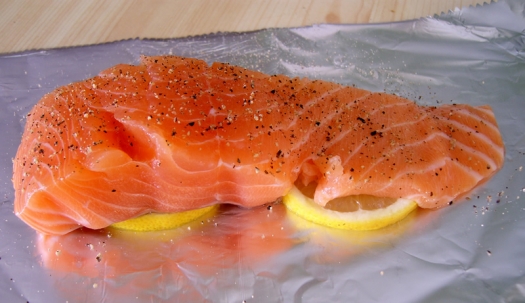The importance of fats and which ones to avoid
SalmonFillet.jpg

Photo by James Bowe, ©2009 / CC BY 2.0
Salmon is a good source of EPA and DHA in Omega-3 fats which is necessary to sustain life.
There may be more misconceptions about dietary fats and oils than any other food item on the planet. This is a travesty because fats are absolutely essential to maintain optimal health. Luckily, we have the research of Dr. Weston A. Price with the modern-day application by David Getoff, CCN, CTN, FAAIM, your Attaining Optimal Health in the 21st Century instructor. Both Dr. Price and David have observed the reversal of degenerative diseases when a diet included ample amounts of these healthy fats. David has researched proper fats and bad fats, and can tell you which are best for you and why, as well as which to always avoid.
Fats and oils are both classified as lipids. Generally, if lipids are semi-solids at room temperature they are labeled fats, and if they are liquid, they are labeled oils.
Fats are usually grouped into Omega-3s, omega-6s and omega-9s. The proper ratios of omega-3s to omega-6s and omega-9s varies, in part, based upon ancestry. It's difficult to give a "one-size-fits-all" approach to the exact ratios each individual should consume for optimal health. However, we do know that the typical American diet ratio of 18 to 1 to 25 to 1, omega-6 fats to omega-3 fats, is unhealthy and partially responsible for a wide variety of degenerative diseases. Americans need to consume more of the omega-3s (from salmon and grass-fed beef), and less of the omega-6s which are found in grains and processed foods.
Government regulations and labeling have misinformed consumers about sources of omega-3s. Flax seed oil is often considered a quality source of omega 3s, but in fact, the omega-3 conversions from flax seed oil happen in the body and only if the body is in great health. The specific omega-3s we need are EPA and DHA and these do not exist in flax seed oil. Many people cannot make that conversion efficiently, so they do not obtain the omega-3s they believe they are consuming. Salmon, krill and cod liver oil consist of readily absorbed, already converted omega threes. The EPA and DHA in Omega-3 fats can only be obtained from animal sources, and are necessary to sustain life.
We have been warned for several years that saturated fats are bad for us. Actually, the saturated fat in inhumanely raised animals is potentially harmful to humans because fat is where toxins and excess hormones are stored in both humans and animals. Inhumanely raised animals eat an improper diet (such as grains for cattle when they should be eating grass) and are stuffed with hormones to unnaturally accelerate growth and to prevent the diseases caused by overcrowded living conditions. However, the saturated fat in properly raised animals (truly free-range chicken and pastured beef and lamb, wild-caught salmon, etc.) is not the health hazard the American government claims it is. Neither is healthy, nutrient-dense butter or coconut oil. Did you know the heart is wrapped in a muscle of saturated fat and that the brain is made of over 60 percent saturated fat?
Brain and heart health are clearly imperative to survival, so feeding these organs is important.
Saturated fat is an important source of vitamin A. Vitamin A, in its true form, does not exist in carrots and other vegetables as nutrition labels claim. Vitamin A in vegetables is actually beta-carotene and a healthy body usually possesses some ability to change beta-carotene into vitamin A. An unhealthy person may only be able to turn a minute amount of beta-carotene into vitamin A, and a healthy person will not be able to convert all of the beta-carotene consumed into vitamin A. This is why it is very likely a vegan will be very vitamin A deficient. And, as a vegan grows more and more unhealthy, they rapidly lose the ability to convert the beta carotene from all their kale and carrots into vitamin A. Kale and carrots are very nutritious foods. But they cannot promote optimal health without the additions of fats to the diet.
It is on the beta-carotene conversion basis that the FDA allows so many non-animal foods to claim they contain high amounts of vitamin A. This is why it is very likely a vegan will be very vitamin A deficient. Vegans consume no food that actually contains vitamin A. True vitamin A is a fat-soluble nutrient and can only be found in its proper form in saturated fats, including full-fat dairy products, butter, etc.
Contrary to popular belief, trans fats (unsaturated fat with trans-isomer fatty acids) are not simply overheated oils and fats. Over-processing and over-heating oil does form lipid peroxides which, when consumed, can damage human cell walls. David Getoff often hears people stating that overheating oils causes them to form into trans fats. This is incorrect. Oxidizing fats does not lead to a new chemical structure of trans fats. Trans fats are formed via partial hydrogenation rather than overheating. To hydrogenate oil, hydrogen is added to the oil and is bonded onto the oil molecules via a catalyst (usually nickel).
Food labeling laws have been formatted so that if a food contains a small amount of trans fats, it is allowed to be labeled as "0% trans fats." The ingredient list is the best way to check and see if a food contains trans fats. If a food states "hydrogenated, partially hydrogenated, or shortening" then it definitely contains trans fats, even if the label claims 0% trans fats.
It is now known that trans fats are responsible for a multitude of health woes, from hardening of the arteries and incidences of heart disease, to raising blood sugar levels and interfering with the body's functions on a cellular level. No amount of trans fats is safe to consume, and a health-conscious individual will want to keep his diet free of this toxic, unnatural fat.
Oils that were once considered healthy but are now known to affect the body negatively include canola oil and cottonseed oil. Canola oil (an omega-6 oil) is a genetically modified fat, also known as rapeseed oil. The oil is pressed from the genetically modified rapeseed. The term "canola oil" stems from combining the words "Canada" and "oil," as this oil was first made in Canada. This oil is known to interfere with thyroid hormone production, and like other genetically-altered foods, can cause nerve damage.
Cottonseed oil is unnatural for human consumption as it comes from cotton. Typically boll weevils, not humans, eat cotton! Cotton is usually sprayed with a wide variety of chemicals and toxins not permitted on foods, since it is not generally intended for human consumption. Oil pressed from heavily sprayed plants is not a health food.
For more information contact Lindsay Wikholm, Administrative Assistant at the Price-Pottenger Nutrition Foundation®
Join PPNF and be a part of an international network of people dedicated to achieving optimal health. Please visit the PPNF Blog to read more articles from the Price-Pottenger Nutrition Foundation®.
See also Dispelling the Big Fat Myths: Part 2 – Fats that are good for you on the FAIM website.


